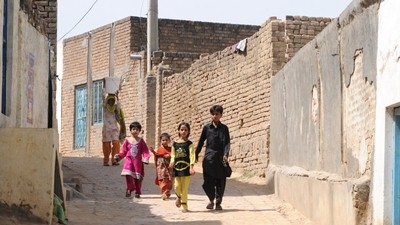AHEER, Gujar Khan, Pakistan – The narrow brick lane outside Naeem Ahmed’s home is paved with the gold and goodwill of his community.
“Each day when I walk down this path, I feel so much pride in myself and my village,” says Ahmed, 42. “Together, we worked so hard to make this little road, this big dream of ours come true.”
For generations, Ahmed’s family has lived in Aheer village, a small farming community on the outskirts of Gujar Khan, about 60 km from Islamabad. Until recently, the 2,400 villagers there were often forced to wade through mud, sewage, garbage or whatever else flowed through its winding lanes.
Now, a 300-meter network of pathways is solidly lined with bricks arranged in an intricate herringbone pattern. A sewage drainage system runs beneath it all, and villagers feel proud, says Ahmed.
“Before the pavement, it was so bad because dirty waters brought diseases to our village,” says Ahmed. “Now everything is cleaner and my wife is so happy. Before there could even be fights between neighbors about all this filth.”
The road pavement project has been made possible by the National Rural Support Programme (NRSP), a local civil society partner organization of PPAF, with assistance from the Pakistan Poverty Alleviation Fund (PPAF), supported by World Bank financing and small contributions from each villager in the form of cash and kind.
Road brings lasting benefits
Ahmed, a mason by trade, personally did the lane paving in September 2011. The daily wages that he earned on the job were only one benefit, he says. “I knew my neighbors paid what they could for this project and I was determined to do a good job, working twice as long and hard,” he says.
“I worked with a lot of emotion and dedication,” he adds. “It was my hope and dream that my home and village could be so clean. None of us could have done this alone, but together we managed it.”
Outside Ahmed’s home, his wife, Abida Naeem, 32, says she no longer minds sweeping the short section of lane outside her gate each morning while chatting with neighbors also determined to keep the village tidy.
“It was very smelly and bad before with so many flies and mosquitoes, and people argued about dirt coming into their houses,” recalls Naeem. “Now there is less sickness and people are content .”

